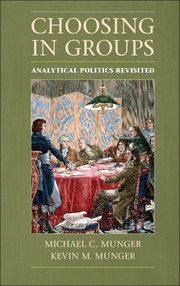Book contents
- Frontmatter
- Dedication
- Epigraph
- Contents
- List of Figures
- List of Tables
- Preface
- I Basics
- 1 The Analysis of Politics
- 2 Becoming a Group: The Constitution
- 3 Choosing in Groups: An Intuitive Presentation
- 4 The Analytics of Choosing in Groups
- II Spatial Theory
- III Extensions
- Answers to Selected Exercises
- Notes
- References
- Index
4 - The Analytics of Choosing in Groups
Published online by Cambridge University Press: 05 February 2015
- Frontmatter
- Dedication
- Epigraph
- Contents
- List of Figures
- List of Tables
- Preface
- I Basics
- 1 The Analysis of Politics
- 2 Becoming a Group: The Constitution
- 3 Choosing in Groups: An Intuitive Presentation
- 4 The Analytics of Choosing in Groups
- II Spatial Theory
- III Extensions
- Answers to Selected Exercises
- Notes
- References
- Index
Summary
An iron rule exists in genetic social evolution. It is that selfish individuals beat altruistic individuals, while groups of altruists beat groups of selfish individuals. The victory can never be complete; the balance of selection pressure cannot move to either extreme.
E.O. Wilson. The Social Conquest of the Earth.In Chapter 3, we presented the conceptual problem of choosing in constituted groups. This problem often is called “social choice theory,” and it uses individual preference orderings as data to arrive at an aggregate ordering over alternatives or states of the world. Social choice theory is an analytic approach to the tension highlighted by E. O. Wilson in the quote above: Individuals want things, but groups do things. A selfish individual will die without a group, but effective groups have to solve the problem of satisfying the needs of selfish individuals. The trick is to choose rules that enable the group to perform as if it were composed of individuals who want to cooperate, when in fact at least some group members might cheat on the agreement if they could.
Wilson developed his logic as evolutionary theory, primarily in non-human species (his special interest, in fact, was insects). Animal and even plant species that “cooperate” do so by being rewarded in terms of differential fitness, meaning survival and reproduction. Such species do not choose their rules; the rules choose them! Good rules are those that increase fitness and groups or species that have good rules survive. Humans, by contrast, do choose rules. But humans evolved in settings where the need to cooperate and yet still achieve essentially selfish goals was important. There are arguments about whether humans have an ethical or moral sense because of evolution, expressed through emotions, or whether humans developed a moral sense through reason. Either way, choosing in groups is the key social problem faced by communities of humans, in the Stone Age and today.
- Type
- Chapter
- Information
- Choosing in GroupsAnalytical Politics Revisited, pp. 58 - 80Publisher: Cambridge University PressPrint publication year: 2015



